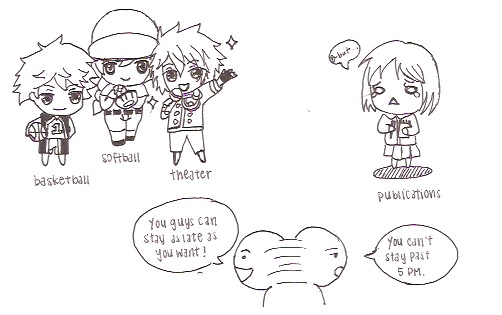
Illustration by Eva Fong.
Publications policy inhibits students
Policies differ depending on the subject that they are applied to. Sports teams, for example, are not subject to the same restrictions that academic extracurriculars or service clubs are, simply because of the nature of their activities. It is, after all, highly unlikely that a member of Academic Decathalon will break a leg during competition. Likewise, publications classes do not possess the same policies that other school organizations do, as the function of publications is to serve as a source of information for the student body and as a forum for student opinions.
Because of the prominence of publications on campus, naturally, a unique set of rules must be applied to its members; the Alhambra Unified School District approved a new publication code in Fall 2015 for all student publications to follow, even club newsletters. The code cemented that current students must be held to the standards of professional journalistic ethics and an academic level of English proficiency, in addition to several new regulations.
One such regulation is that the publications staff is not allowed to stay on campus past the last bus, which departs at 5:15 p.m.. Likewise, the school newspaper may not publish content on its website during the summer or over breaks, and the website must be hosted on district servers, whereas it had previously been hosted by third party providers. The policy also states that only current students can prepare or assist the newspaper staff
Some may argue that these are very reasonable restrictions. Why would a student or teacher want to stay on campus after school ended, or work more than necessary? Furthermore, if the staff were truly hardworking, then surely they would be able to complete their work without having to work long hours and compromise their health and safety.
But that brings up a question: if the publications staff cannot stay after five, then why are sports teams and performance groups allowed to? For example, in the weeks before a play, cast members often stay until seven or eight in the evening to perfect their performance, as do some sports teams, and yet, there is no policy forbidding them from working on campus after hours. What difference is there between theatre, publications, sports, and all extracurriculars which demand practice to achieve perfection?
Understandably, specific policies must be established for specific activities, but if student safety and educational quality remain a priority to administration, then shouldn’t there be consistent standards in some aspects for all student activities across campus? In neglecting to provide uniform guidelines, or perhaps by not enforcing them, the district has limited The Matador’s productivity and curbed its passion for reporting the truth, especially since the policies were developed after a summer that resulted in The Matador receiving several national journalism awards. Although these policies were implemented to “protect” publications, The Matador questions their timing and intentions.
An online copy of the publications code can be found here.